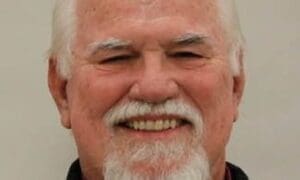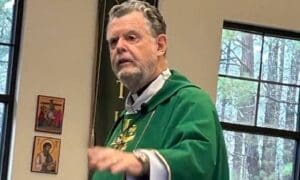Come and sit with me in the front row of a lecture at the Theological Conference I attended recently. The professor is about to begin. He’s the Rev. Dr. Stephen J. Hultgren, a Bible scholar from Fordham University in New York. He’s a solidly grounded young scholar with a brilliant mind and wonderful balance of tradition and modern methods for using and interpreting Holy Scripture.
He’s speaking on “The Crisis in the Authority of Scripture.” Some of it is pretty “heavy” stuff. But I think you’ll understand with no problem. He is a Lutheran lecturing to Lutherans, but his message is for all of us. Let’s listen:
“The question, in brief, is this: Who gets to decide when, how and where Scripture speaks the Word of God to the church? Does God decide or do we decide?
“This is the question: Will the church allow the words of Scripture — all of them — to speak to the church as the Word of God and to make their claim upon us or will the church presume to decide in advance when and where Scripture may still be allowed to speak to us as God’s Word?
“All of canonical Scripture — Old Testament and New Testament, all of it — is the Word of God for the church.
“It belongs to the authority of Scripture itself — not to the authority of the church — to decide which commandments are of passing significance and which are of abiding significance. Scripture itself shows us the way.
“As we look forward to renewed lives of faith, how might we think about and live Biblical authority?
“1. (Professors love to number things in their lectures, as you know.) The church will take all of Scripture — the whole canonical Old and New Testaments in their entirety — as the Word of God for the church. That does not mean fundamentalism. Rather, it means taking seriously the canonical unity of Scripture as summarized in the classical creeds of Christianity (The Apostles’ Creed for example) and, of course for us as Lutherans in the Confessions (the writings at the time of Martin Luther and The Reformation in the 16th century), and then allowing the chief articles of faith to set the proper and right accents in the interpretation of Scripture.
“The Biblical canon (the collected Books of the Bible as we have it) cannot be regarded theologically as a mere accident of history. It must be regarded as a collection of writings in which the Church, over a long period of reflection and debate, came to hear the voice of a single God revealing himself and his will in as full a way as possible this side of heaven. The voice of that single God is heard most clearly in Jesus Christ and to him the prophetic and apostolic writings of the Old and New Testaments bear witness in their entirety.
“2. The church will not presume to decide in advance where in Scripture God’s commandments continue to speak to the church and where they do not. Scripture, in its canonical unity, shows us which commandments remain binding for Christians and why. Nor will the church play off each other the gospel of justification by grace through faith and the moral teaching of Scripture (in other words, one does not negate the other).
“3. The Lutheran Church will seek to enrich and to be enriched by all churches that adhere to the ancient creeds as true summaries of Scripture. The Lutheran Church will always be concerned that the teaching and practice never violate the doctrine of justification.
“At the same time, however, the Lutheran Church will not use the doctrine of justification by grace through faith as a pretext for gutting the doctrinal and moral consensus of the Church catholic built upon Scripture. The Lutheran Church will seek to be enriched by theological reflection on Scripture from all Christians who read Scripture in agreement with the ancient creeds.
“4. The authority of Scripture in the church will prove itself once again today when the church refuses to allow the claims of Scripture to be reduced to what will fit into agendas drawn from secular ideologies or a world view based solely on human experience. Rather, the church in its preaching and teaching will allow all of the words of Scripture to open up the hearts and minds of men and women to a perception of life, truth and reality that is greater than human imagining or experience.
“And this is particularly important for young people today. The church must open up a vision of life that is at once both faithful to all of Scripture and intellectually compelling. The church must give young people today a vision for the beauty, the truth, the power, and the coherence of a life lived by faith in Jesus Christ and within a view of reality that is shaped from beginning to end by Holy Scripture.”
(Back to me now.) Wow! What a lecture! What a marvelous, powerful, direct, and accurate assessment of the authority of Scripture!
Contact Pastor Kollmeyer at www.princeofpeacefayette.com











Leave a Comment
You must be logged in to post a comment.